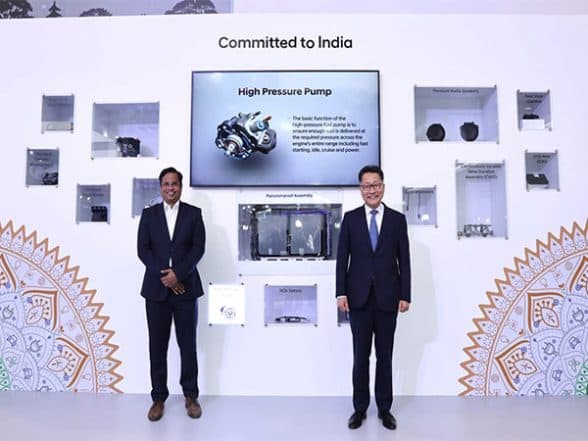There’s a perilous stunt at the heart of The Fall Guy.
More dangerous than the record-breaking truck roll, or surfing a metal trash bin across the streets of Sydney. This is a movie torn between two tracks.
Part is a super-charged satire on the excesses of Hollywood. Much of The Fall Guy takes place on the set of a fictional interstellar epic Metalstorm. Imagine Mad Max meets Dune, except the Mad magazine version. (Yes, I’m old.)
But behind the callous producers and Easter eggs for the Comic-Con crowd is something sweeter and simpler. It’s about Jody Moreno (Emily Blunt) a director with her first big break, still smarting from her relationship with Colt Seavers (Ryan Gosling), the best stuntman in the biz who ghosted her after a high-wire fall went wrong.
If you a fan of the 1980s Lee Majors TV series, there isn’t much to see here. I mean, there’s the truck — the conspicuous gold-and-brown GMC that Colt drives around and, of course, Gosling has taken the TV character’s name and profession. As the original theme song goes, he’s “the unknown stuntman who makes Clint Eastwood look so fine.”
So, in a way, the film is actually balanced on three legs: the action spoof, the romance and also a tribute to the unsung heroes of the industry — stunt performers.
It’s directed by David Leitch, who got one of his first breaks stunt doubling for Brad Pitt in Fight Club. After segueing from stunt co-ordinator to director, with Atomic Blonde, Deadpool 2 and Bullet Train, Leitch has established himself as one of Hollywood’s go-to action auteurs. His movies are like firecrackers, filled with bright colourful explosions but, once the smoke clears, the memory fades.
With The Fall Guy Leitch finally has a film with more to say than the cliche “when you fall down get back up again” ethos which this movie mocks. With his focus on the behind-the-scenes planning that action sequences require, a large part of the film is an affectionate tribute to the men and women who risk their bodies for our entertainment.
Though, like many of his films, this love letter is about as subtle as a fireball. Will you see Gosling and his on-screen stunt co-ordinator, played by Winston Duke, bro down with a fist bump and hand shake while yelling “Yeah boy, stunts!”? Yes you will.
So, if we’re to make a movie celebrating Hollywood’s human punching bags, who better than Gosling? Like Harrison Ford, the more battered and bruised he gets, somehow the better. Who winces like Gosling? Who grimaces like Gosling?
And the jabs start early as the movie opens with Gosling doubling for Tom Ryder, the supercilious star played by Aaron Taylor-Johnson.
As Gosling prepares for another take, there’s a conference around the video monitor. Ryder mutters that Colt is showing “too much” of his own face, forcing him to do another dangerous take.
Ryan Gosling decided to crash CBC reporter Eli Glasner’s live TV hit on the Barbie pink carpet in Toronto.
While some of the meta-movie moments are too cute by far, what rings true is the disposable nature of stunt performers. They do the most dangerous job and if they succeed, they’re forgotten. Speaking of disposable, that brings us to to plot which centres on the disappearance of Ryder.
Colt is brought into Metalstorm by the producer — a diet-coke-addicted schemer slurping increasingly bigger tumblers played with scene-shredding abandon by Hannah Waddingham. Improbably, she asks Colt to help find him.

Watching Gosling smash through doors and get mixed up in a scheme involving Ryder feels like thin gruel compared to far superior detective stories such the Gosling and Russell Crowe vehicle The Nice Guys. But we didn’t come here for the plot. (Well if you did, I’m sorry.) We came for a lark, and on that Leitch and screenwriter Drew Pearce serve up plenty. There’s the drug-laced nightclub fight where Gosling transforms into something like a Street Fighter battle scene. Or his haphazard attempts to solve the mystery while battling stubborn room cards, hallucinations and fending off bad guys with movie props.
Along for the ride is Winston Duke, underutilized as Dan, Colt’s long-time stunt co-ordinator, and the equally wasted Stephanie Hsu as Ryder’s ambitious assistant. While the action set pieces are fun and a fantastic forum for old-fashioned stunt spectacles, it’s the screwball chemistry between Jody and Colt that fuels The Fall Guy’s best bits.
Like any good romance there’s a misunderstanding — the stuntman is under the impression the director asked for him. Instead Jody, now Colt’s boss, uses her leverage to put him through his paces. There’s an awkward on-set conversation about a character’s motivation through a megaphone when Gosling delightfully squirms while being set on fire and thrown repeatedly against a wall.

Even better are the quiet moments; Jody’s amusing awkwardness sitting in the cab of Colt’s truck. Like Elliot Gould, Gosling is one of those rare leading men, tough enough to play the hero but unafraid to let his guard down and share his softer side. It’s that vulnerability that makes Gosling so appealing.
As someone who’s have some brief interactions with Gosling on carpets, he comes as a decent guy, even gamely attempting to answer a reporter’s awkward questions. There’s an earnest quality that cuts through, letting us know he doesn’t take the movie star swagger too seriously. Sure The Fall Guy has a a few moments that oversell Colt’s sensitive side, but if the film’s worst offence is being schmaltzy, Gosling earns it.
Ironically, taking stunt performers and turning them into blue-collar super-heroes able to fight off mercenaries undercuts Leitch’s plan to celebrate the real people who make movies magic.
But at its core The Fall Guy isn’t a documentary, or even a satire. As much as it pokes fun at Hollywood’s bloated blockbusters, in the end it’s a big dumb fun film with a charming couple at its centre. For that part, no special effects or stunt doubles are required.









